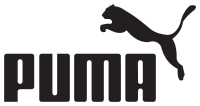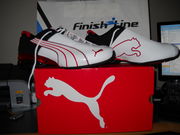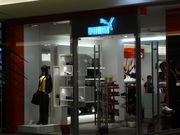Puma AG
 |
|
| Type | Aktiengesellschaft (FWB: PUM) |
|---|---|
| Industry | Clothing and consumer goods manufacture |
| Founded | 1924 (registered in 1948)[1] |
| Founder(s) | Rudolf Dassler |
| Headquarters | Herzogenaurach, Germany |
| Key people | Jochen Zeitz (CEO and chairman of the management board), Melody Harris-Jensbach (deputy CEO), Klaus Bauer (COO), François-Henri Pinault (Chairman of the supervisory board) |
| Products | Footwear, sportswear, sports goods, fashion accessories |
| Revenue | €2.461 billion (2009)[2] |
| Operating income | €192.4 million (2009)[2] |
| Profit | €128.2 million (2009)[2] |
| Employees | 9,650 (end 2009)[2] |
| Parent | PPR |
| Website | www.puma.com |
Puma AG Rudolf Dassler Sport (officially styled PUMA) is a major German multinational company that produces high-end athletic shoes, lifestyle footwear and other sportswear. Formed in 1924 by Rudolf Dassler, the company is based in Herzogenaurach, Germany.
The company is known for its football shoes and has sponsored acclaimed footballers, including Pelé, Eusébio, Johan Cruijff, Enzo Francescoli, Diego Maradona, Lothar Matthäus, Kenny Dalglish, Didier Deschamps and Gianluigi Buffon. Puma is also the sponsor of the Jamaica track athlete Usain Bolt who won three gold medals by breaking the men's 100m, 200m and 4x100m world records in the 2008 Beijing Olympics. In the United States, the company is probably best-known for the suede basketball shoe it introduced in 1968, which eventually bore the name of New York Knicks basketball star Walt "Clyde" Frazier, and for its endorsement partnership with Joe Namath.
The company also offers lines shoes and sports clothing, designed by Lamine Kouyate, Amy Garbers, and others. Since 1996 Puma has intensified its activities in the United States. Puma owns 25% of American brand sports clothing maker Logo Athletic, which is licensed by American professional basketball and association football leagues. Since 2007 Puma AG has been part of the French luxury group PPR.
Contents |
History
Gebrüder Dassler Schuhfabrik
Christoph von wilheml Dassler was a worker in a shoe factory, while his wife Pauline ran a small laundry in the Bavarian town of Herzogenaurach, 20 kilometres from the city of Nuremberg. Their son Rudolf Dassler after leaving school joined his father at the shoe factory, and was then called up to fight in World War I. On his return from the front, Rudolf took a management position at a porcelain factory, and later in a leather wholesale business in Nuremberg.
After tiring of working for others and away from home, Rudolf returned to Herzogenaurach in 1924 to join his younger brother Adolf, nicknamed "Adi", who had founded his own shoe factory. They named the new business Gebrüder Dassler Schuhfabrik (Dassler Brothers Shoe Factory). The pair started their venture in their mother's laundry, but at the time, electricity supplies in the town were unreliable, and the brothers sometimes had to use pedal power from a stationary bicycle to run their equipment.[3] By the 1936 Summer Olympics, Adi Dassler drove from Bavaria on one of the world's first motorways to the Olympic village with a suitcase full of spikes and persuaded United States sprinter Jesse Owens to use them, the first sponsorship for an African-American. After Owens won four gold medals, his success cemented the good reputation of Dassler shoes among the world's most famous sportsmen. Letters from around the world landed on the brothers' desks, and the trainers of other national teams were all interested in their shoes. Business boomed and the Dasslers were selling 200,000 pairs of shoes each year before World War II.[4]
Company split
Both brothers joined the Nazi Party, but Rudolf was slightly closer to the party. During the war, a growing rift between the pair reached a breaking point after an Allied bomb attack in 1943 when Adi and his wife climbed into a bomb shelter that Rudolf and his family were already in: "The dirty bastards are back again", Adi said, apparently referring to the Allied war planes, but Rudolf was convinced his brother meant him and his family[5]. After Rudolf was later picked up by American soldiers and accused of being a member of the Waffen SS, he was convinced that his brother had turned him in. [3]
In 1948, the brothers split their business. Rudi left the high hill for the other side of the Aurach river to start his own company. It was from this split that Adolf started his own sportswear company with the name he formed using his nick name "Adi" and the first three letters of his last name "Das", to establish Adidas. Rudolf created a new firm that he called Ruda – from "Ru" in Rudolf and "Da" in Dassler.
Creation of Puma

Rudolf's company changed its name to Puma Schuhfabrik Rudolf Dassler in 1948, and became a public company in 1986, listed on the Börse München and Frankfurt Stock Exchange.
The sponsorship of sports stars continued, including:
- 1948 – In the first football match after World War II, several members of the West German national football team wear Puma boots, including the scorer of West Germany's first post-war goal, Herbert Burdenski
- 1952 Summer Olympics – Josy Barthel of Luxembourg won Puma's first Olympic Gold (1500m) in Helsinki, Finland
- 1960 Summer Olympics – Puma paid German sprinter Armin Hary money to wear Pumas in the 100 metres final. Hary had worn Adidas before and asked Adi for payment, but Adidas rejected this. Hary won gold in Pumas, but then laced up Adidas for the medals ceremony – to the shock of both Adi and Rudolf. Hary hoped to cash in from both with the trick, but Adi was so enraged he banned the Olympic champion.[4]
- 1970 FIFA World Cup – Pelé stopped the referee with a last-second request to tie his shoelaces at the opening whistle of a 1970 World Cup finals match and then knelt down to give millions of television viewers a close-up of his Pumas. Pelé was complying with a request by Puma's representative Hans Henningsen to raise the German sports shoe company's profile after they gave him $120,000 to wear their boots.[4]
- 1972 Summer Olympics – Puma provided running shoes for the 400m hurdles champion, John Ake Bua, from Uganda. After Ake Bua was forced out of Uganda by its military government, Puma employed Ake Bua in Germany, and tried to help integrate him and his family in German society, but eventually Ake Bua returned to Uganda.
However, the brothers earlier split led to a divided town. From 1948, the town was really split into like a sort of mini Berlin. Brand loyalty became paramount for many residents, and there were stores, bakers and bars which were unofficially known as either loyal to Rudolf's Puma, or to Adolf's Adidas. The town's two football clubs were also divided: ASV Herzogenaurach club wore the three stripes, while 1 FC Herzogenaurach had the jumping cat on its footwear. Intermarriage was frowned upon. When handymen came to work at Rudolf's home, they would wear Adidas shoes on purpose so that when Rudolf would see their footwear, he'd tell them to go to the basement and pick out a pair of Puma shoes, which they could have for free.[3] The two brothers never reconciled, and although both are buried in the same cemetery, they are spaced apart as far as possible.
In May 1989, Rudolf's sons Armin and Gerd Dassler agreed to sell their 72 percent stake in Puma, to Swiss business Cosa Liebermann SA.[6]
Controversy
Organisations promoting fair trade and workers' rights criticise Puma's employment practises in their developing world factories, predominantly relating to workers in China, Turkey, El Salvador and Indonesia.[7][8][9]
Timeline
- 1920: Rudolf Dassler and his brother Adolf start making sports shoes.
- 1924: Foundation of Gebrüder Dassler Schuhfabrik, Herzogenaurach, Germany.
- 1948: Foundation of Puma Schuhfabrik Rudolf Dassler (October 1.), Introduction of the ATOM, Puma's first football shoe.
- 1949: Rudolf Dassler has the idea of football shoes with removable studs. He begins working on their development and production.
Many football experts, like Sepp Herberger, are involved.
- 1952: Introduction of the SUPER ATOM.
- 1953: Development of ATOM's successor: the BRASIL.
- 1958: Introduction of Puma's signature formstrip at the FIFA World Cup in Sweden.
- 1959: The company is transformed into a limited partnership named Puma-Sportschuhfabriken Rudolf Dassler KG.
- 1960: Introduction of the technologically advanced vulcanization production technique.
- 1966: Launch of the WEMBLEY, the predecessor model to the Puma King.
- 1968: Launch of the legendary KING. Puma is the first manufacturer to offer sports shoes with Velcro fasteners.
- 1974: Rudolf Dassler dies. His sons Armin and Gerd take over the company's management.
- 1976: Introduction of the revolutionary S.P.A.-Technology.
- 1986: Transformation into a stock corporation.
- 1989: Launch of the TRINOMIC sport shoe system.
- 1990: Introduction of INSPECTOR, a growth control system for children's shoes.
- 1991: Launch of the DISC SYSTEM sports shoe.
- 1992: Capital increase by DM 20 million, share capital reaches DM 70 million.
- 1993: Jochen Zeitz is appointed Chairman and CEO, Proventus/Aritmos B.V. becomes majority shareholder.
- 1994: The first profit since the company's IPO in 1986 is regeristered.
- 1996: Puma is listed in the German M-DAX index; introduction of the CELL technology, the first foam-free midsole.
- 1997: Launch of the CELLERATOR.
- 1998: Puma merges sports and fashion. The company starts a cooperation with designer Jil Sander.
- 1999: Puma becomes an official on-field supplier of the U.S. National Football League (NFL).
- 2000: Production of fireproof footwear in partnership with Porsche and Sparco.
- 2001: Acquisition of the Scandinavian Tretorn Group.
- 2002: Launch of the SHUDOH.
- 2003: Majority shareholder Monarchy/Regency sells its shareholdings to a broad base of institutional investors.
- 2004: Collaborative partnership with world-renowned designer Philippe Starck.
- 2005: Mayfair Vermögensverwaltungsgesellschaft mbh acquires a total of 16.91% shareholding.
- 2006: The company is listed in the Dow Jones Sustainability Index; Introduction of the S.A.F.E. concept, a specific tool developed to continuously improve social and environmental standards. Shoe collection in cooperation with Alexander McQueen. Italy would go on to win the world cup as they are sponsored by puma many of the teams soccer( football) players wearing puma cleats.
- 2007: Voluntary public take-over by Pinault-Printemps Redoute; Prolongation of the contract with Jochen Zeitz by five years.
- 2008: Melody Harris-Jensbach is appointed Deputy CEO; Designer and artist Hussein Chalayan becomes Creative Director, Puma also acquires a majority stake in Chalayan's business and Hussein Chalayan.
- 2010: Signs two year deals to make the kits of Newcastle United, Motherwell, Hibernian & Burnley from the 2010–11 season.
Present day

Puma AG has approximately 9,204 employees and distributes its products in more than 80 countries. For the fiscal year 2003, the company had a revenue of €1.274 billion. Puma were the commercial sponsors for the 2002 anime series Hungry Heart: Wild Striker, with the jerseys and clothing sporting the Puma brand.
The company has been conducted by CEO and Chairman Jochen Zeitz since 1993. His contract has been extended ahead of schedule for four more years until 2012 in October 2007.[10]
Japanese fashion guru Mihara Yasuhiro teamed up with Puma to create a high-end and high-concept line of sneakers[11]
Puma is the main producer of enthusiast driving shoes and race suits. They are the prime producer in both Formula One and NASCAR especially.
They had successfully won the rights of sponsoring the 2006 FIFA World Cup champions, the Italian national football team, with them making and sponsoring the clothing worn by the team. Their partnership with Ferrari and BMW to make Puma-Ferrari and Puma-BMW shoes has also contributed to this success. On 15 March 2007, Puma launched its first new 2007/2008 line of uniforms for a club, and Brazilian football club Grêmio will be the first to use the laser sewn technology, similar to the one worn by Italy at the 2006 World Cup. Grêmio and other Brazilian clubs will be the first to use the technology because their season starts six months earlier than European clubs. Puma also makes baseball cleats, and Johnny Damon, the outfielder for the Detroit Tigers, is their spokesperson. He has his own cleat called the "DFR Metals".
The legendary KING
In 2008, Puma celebrated the 40th anniversary of the KING with a special anniversary edition.[12], the KING XL (XL is 40 in Roman Numerals), a tribute to Portuguese footballer Eusébio, who shot 42 goals with the legendary KING in 1968, winning the Golden Boot Award as Europe's leading scorer. The KING also was the favourite shoe of players like Pelé, Mario Kempes, Rudi Völler, Lothar Matthäus, Massimo Oddo and Diego Maradona. Puma have continued to release new versions of the King range, and released a version in 2009 to celebrate the history of Italian soccer, and in particular double World Cup winning coach Vittorio Pozzo, the Puma King XL Italia[13].
PPR
In February 2007, Puma reported that its profits had fallen by 26% to €32.8 million ($43 million; £22 million) during the final three months of 2006. Most of the profit decline was due to higher costs linked to its expansion, and sales actually rose by more than a third to €480.6 million.[14]
In early April 2007, Puma's shares rose €29.25 per share, or 10.2% higher, at €315.24 per share.[15] On 10 April 2007, French retailer and owner of Gucci brand Pinault-Printemps-Redoute (PPR) announced that it had bought a 27% stake in Puma, clearing the way for a full takeover. The deal values Puma at €5.3 billion. PPR said that it would launch a "friendly" takeover for Puma, worth €330 a share, once the acquisition of the smaller stake was completed. The board of Puma welcomed the move, saying it was fair and in the firm's best interests.[16] On 17 July 2007 PPR have 62.1 % of Puma stocks.
While PPR owns the majority of Puma's stock, Puma remains an independent company.
Sponsorship
Acquisitions
On March 10, 2010 Puma announced it will acquire 100 percent of Cobra Golf, based in Carlsbad, California, from Fortune Brands Inc., but did not provide any financial details. The deal which faces regulatory approval is expected to close in the second quarter.[17]
References
- ↑ Adidas Group History
- ↑ 2.0 2.1 2.2 2.3 "Annual Report 2009". Puma AG. http://ir2.flife.de/data/puma/igb_html/pdf/1000003_e_double.pdf. Retrieved 31 July 2010.
- ↑ 3.0 3.1 3.2 The Town that Sibling Rivalry Built, and Divided | Business | Deutsche Welle | 03.07.2006
- ↑ 4.0 4.1 4.2 How Adidas and PUMA were born
- ↑ Review of "Sneaker Wars: The Enemy Brothers Who Founded Adidas and PUMA and the Family Feud That Forever Changed the Business of Sport", Barbara Smit, March 2008, ISBN 9780061246579
- ↑ Dasslers sell Puma to Cosa. (Armin and Gerd Dassler, Puma AG, Cosa Liebermann Ltd., sports clothing trade) | Daily News Record | Find Articles at BNET.com
- ↑ http://www.chinalaborwatch.org/2008615.htm
- ↑ http://fairtrade.change.org/?page=28
- ↑ http://www.greenleaf-publishing.com/content/pdfs/jcc13huss.pdf
- ↑ PUMA's News Archive (9th of october 2007)
- ↑ PUMA SNEAKERPEDIA
- ↑ PUMA King XL 40th Anniversary Edition Soccer Cleat Stars | Soccer
- ↑ PUMA King XL Italia Review Soccer Cleat 101 | Soccer
- ↑ "Puma sees sharp fall in profit". BBC News. 19 February 2007. http://news.bbc.co.uk/1/hi/business/6375175.stm. Retrieved 22 May 2010.
- ↑ "Puma's shares surge on bid rumour". BBC News. 5 April 2007. http://news.bbc.co.uk/1/hi/business/6530423.stm. Retrieved 22 May 2010.
- ↑ "Gucci-firm PPR buys stake in Puma". BBC News. 10 April 2007. http://news.bbc.co.uk/1/hi/business/6540391.stm. Retrieved 22 May 2010.
- ↑ "Puma acquires Cobra Golf". 10 March 2010. http://www.businessweek.com/ap/financialnews/D9EBRMAG0.htm. Retrieved 11 March 2010.
External links
|
|||||